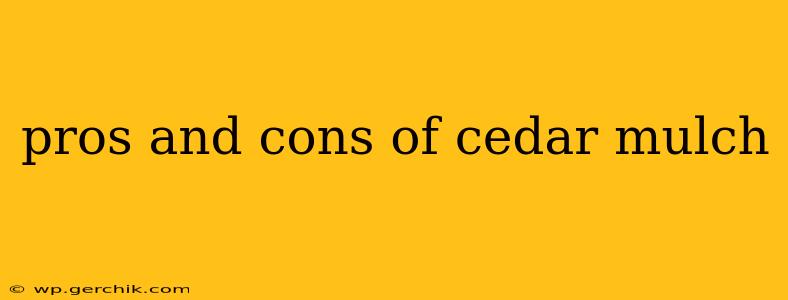Cedar mulch is a popular choice for landscaping, prized for its rich aroma and attractive reddish-brown hue. But is it the right mulch for your garden? This comprehensive guide delves into the pros and cons of cedar mulch, helping you make an informed decision for your landscaping needs.
The Alluring Advantages of Cedar Mulch
Cedar mulch offers a compelling array of benefits that make it a favorite among gardeners and landscapers alike. Let's explore these advantages:
Aesthetic Appeal:
Cedar mulch boasts a naturally attractive reddish-brown color that enhances the beauty of any garden. Its uniform texture and pleasant scent add to its overall appeal, creating a visually pleasing and fragrant landscape.
Insect and Pest Repellent:
One of the most significant advantages of cedar mulch is its natural insect and pest-repelling properties. The oils present in cedar wood act as a deterrent against various insects, termites, and other pests that can damage plants and structures. This can reduce the need for chemical pesticides, contributing to a more eco-friendly garden.
Weed Suppression:
Cedar mulch effectively suppresses weed growth, saving you time and effort on weeding. The dense layer of mulch blocks sunlight, preventing weed seeds from germinating and existing weeds from thriving. This leads to a cleaner, more manageable garden.
Soil Improvement:
As cedar mulch decomposes, it gradually improves soil structure and fertility. It adds organic matter to the soil, enhancing drainage, aeration, and water retention. This results in healthier plants with improved growth and yield.
Moisture Retention:
Cedar mulch helps retain soil moisture, reducing the frequency of watering. This is particularly beneficial during dry spells, conserving water and minimizing the stress on plants.
Long-Lasting:
Compared to some other types of mulch, cedar mulch tends to last longer. Its durability reduces the frequency of mulch replacement, saving you both time and money in the long run.
Potential Drawbacks of Cedar Mulch: Understanding the Limitations
While cedar mulch offers numerous advantages, it's crucial to acknowledge its potential drawbacks:
Cost:
Cedar mulch is often more expensive than other mulches, such as pine bark or hardwood. This can be a significant factor for those working with larger landscaping projects or on a tight budget.
Acidity:
Cedar mulch can slightly acidify the soil as it decomposes. While this can be beneficial for acid-loving plants, it can be detrimental to plants that prefer neutral or alkaline soil conditions. Regular soil testing is recommended to monitor soil pH levels.
Aroma:
While many find the cedar scent pleasant, some individuals may find it overpowering or irritating. Consider this if you have sensitivities to strong smells or if the mulch will be placed near seating areas or windows.
Decomposes More Slowly Than Other Mulches:
While its slow decomposition is beneficial in terms of longevity, it also means that it releases nutrients into the soil more gradually than other types of mulch. This can be a factor to consider depending on the specific nutrient needs of your plants.
Frequently Asked Questions (FAQ)
Here are some common questions about cedar mulch that we'll address:
How long does cedar mulch last?
Cedar mulch typically lasts 1-2 years, depending on factors like weather conditions, sunlight exposure, and the thickness of the application.
Is cedar mulch safe for pets?
Cedar mulch is generally considered safe for pets in moderate amounts. However, ingestion of large quantities could cause gastrointestinal upset. It's best to keep pets from consuming the mulch.
What is the best way to apply cedar mulch?
Apply a layer of cedar mulch 2-3 inches deep, ensuring it's evenly distributed around plants, avoiding direct contact with plant stems.
Is cedar mulch good for vegetable gardens?
Cedar mulch can be beneficial for vegetable gardens due to its weed-suppressing and pest-repelling qualities. However, be mindful of the soil acidification effect.
Does cedar mulch attract termites?
Contrary to some misconceptions, cedar mulch, due to its natural oils, is actually known to deter termites, not attract them.
Conclusion: Making the Right Choice
Cedar mulch offers a compelling blend of aesthetic appeal, pest-repelling properties, and soil improvement benefits. However, its cost and potential for soil acidification should be carefully considered. By weighing the pros and cons based on your specific landscaping needs and plant preferences, you can determine whether cedar mulch is the right choice for your garden. Remember to always conduct regular soil testing to ensure the overall health and well-being of your plants.
